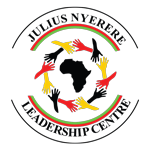Julius Nyerere Leadership Centre (JNLC), in partnership with the United Nations Development Programme (UNDP), Makerere University, and the Uganda Management Institute (UMI), recently concluded a transformative series of youth leadership training workshops in two key regions of Uganda: Mbale District and Gulu District. These workshops, part of the #JNLCTraining2024 initiative, attracted over 80 aspiring young women and student leaders, emphasizing the importance of transformative and inclusive development.
Empowering Youth for Leadership
The training, held at the Islamic University in Uganda (IUIU) from September 19 to 21, 2024, and at Gulu University from September 23 to 25, 2024, was designed to equip participants with essential leadership skills. With the theme “Leadership Training for Transformative and Inclusive Development,” the initiative aimed to prepare emerging leaders to effectively tackle societal challenges through enhanced communication, decision-making, negotiation, conflict resolution, and leadership within Uganda’s multiparty system. Moreover, it highlighted the critical need for advocacy concerning gender equality and the inclusion of marginalized groups in leadership roles.
Dr. Muwanga, the Executive Director of JNLC, opened the sessions in both regions, delivering inspiring remarks that emphasized the vital role of youth leadership in shaping the future of Uganda and the East African region. She expressed gratitude to UNDP for enabling JNLC to conduct this pivotal training, which drew participants from a competitive pool of hundreds of applicants.
Mbale Training Highlights: September 19 to 21, 2024
In Mbale, the training commenced with Dr. Jamil Serwanga, Vice Rector of Academic Affairs at IUIU, underscoring the significance of youth leadership. Ms. Asumin Nasike, the Resident City Commissioner (RCC) of Mbale, officially inaugurated the training, encouraging participants to leverage their leadership positions to aspire for higher roles.
Ms. Annet Mpabulungi Wakabi from UNDP Uganda also expressed her appreciation for Islamic University in Uganda (IUIU)’s support in hosting the training and reiterated the importance of empowering young women and youth leaders in active leadership roles. In her impactful address, Ms. Nasike highlighted the power of information in leadership and shared her personal journey, emphasizing, “Information is power.”
Gulu Training Highlights: September 23 to 25, 2024
The Gulu training began with a warm welcome from Dr. Olido Kenneth, Dean of the Faculty of Business & Development Studies, who represented Vice-Chancellor Prof. Openjuru George. He commended the initiative for its potential to drive meaningful change among young women and youth leaders. Ms. Wakabi once again voiced her gratitude to Gulu University for hosting the training, acknowledging the role academic institutions play in shaping future leaders.
The closing ceremony in Gulu featured a keynote address by Nwanne Vwede-Obahor, UNDP Uganda Resident Representative, who inspired the participants by redefining leadership. She stated, “Leadership is not about occupying positions or spaces; it is about creating momentum, gathering critical mass, and addressing issues. Anyone can be a leader, anywhere, at any time.”
As a token of commitment to climate action, each participant received a young tree to plant, symbolizing growth and sustainability. The #JNLCTraining2024 initiative not only aims to empower future leaders but also reinforces the importance of environmental stewardship.
A Path to Transformative Leadership
Throughout the three-day workshops, facilitators engaged participants in interactive sessions, team-building exercises, and round-table discussions, ensuring that everyone departed with the confidence and skills necessary for future leadership roles. Dr. Muwanga praised the participants for their dedication, asserting that their involvement exemplifies the leadership potential Uganda and Africa must harness for a brighter future.
Core Training Modules
The training encompassed critical leadership topics, including:
- Fundamentals of democracy and Uganda’s multiparty system
- Leadership styles, effective qualities, and self-assessment
- Public speaking, active listening, and social media communication
- Strategic planning, vision, and mission development
- Decision-making, creative problem-solving, and conflict resolution
- Advocacy for gender equality and inclusion of marginalized groups
- Building and leveraging professional networks
- Mental health awareness and sustainability in leadership
- Emotional intelligence and financial literacy
Conclusion
The successful completion of the youth leadership training workshops in Mbale and Gulu marks a significant step towards empowering young women and youth leaders in Uganda. By providing them with the necessary skills and knowledge, JNLC, alongside its partners, is fostering a new generation of leaders committed to creating positive change in their communities and beyond. As we celebrate the achievements of these participants, we look forward to witnessing their contributions to a transformative future.









